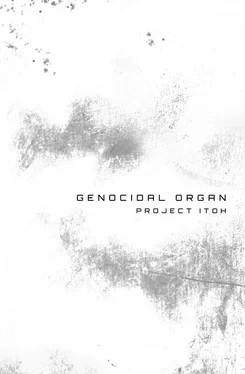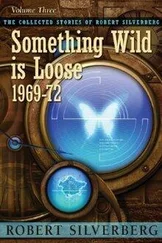Project Itoh - Genocidal Organ
Здесь есть возможность читать онлайн «Project Itoh - Genocidal Organ» весь текст электронной книги совершенно бесплатно (целиком полную версию без сокращений). В некоторых случаях можно слушать аудио, скачать через торрент в формате fb2 и присутствует краткое содержание. Год выпуска: 2012, ISBN: 2012, Издательство: Haikasoru/VIZ Media, Жанр: Старинная литература, на английском языке. Описание произведения, (предисловие) а так же отзывы посетителей доступны на портале библиотеки ЛибКат.
- Название:Genocidal Organ
- Автор:
- Издательство:Haikasoru/VIZ Media
- Жанр:
- Год:2012
- ISBN:9781421550886
- Рейтинг книги:4 / 5. Голосов: 1
-
Избранное:Добавить в избранное
- Отзывы:
-
Ваша оценка:
- 80
- 1
- 2
- 3
- 4
- 5
Genocidal Organ: краткое содержание, описание и аннотация
Предлагаем к чтению аннотацию, описание, краткое содержание или предисловие (зависит от того, что написал сам автор книги «Genocidal Organ»). Если вы не нашли необходимую информацию о книге — напишите в комментариях, мы постараемся отыскать её.
Genocidal Organ — читать онлайн бесплатно полную книгу (весь текст) целиком
Ниже представлен текст книги, разбитый по страницам. Система сохранения места последней прочитанной страницы, позволяет с удобством читать онлайн бесплатно книгу «Genocidal Organ», без необходимости каждый раз заново искать на чём Вы остановились. Поставьте закладку, и сможете в любой момент перейти на страницу, на которой закончили чтение.
Интервал:
Закладка:
I remember thinking how convenient it’d be if our bodies had metahistories. If each cell had its individual tag full of metadata, then how easy it would be to slot these piles of flesh back together.
Metahistories. Alpha consumers could spend all day staring history in the face in the form of the provenance of whatever consumer good they were considering purchasing. You could trace each individual ingredient of a Domino’s Pizza back to where it came from. A microhistory of each constituent part: cheese, jalapeños, ham, pineapple, the wheat and egg in the dough. All were fully traceable, not just back to where they were made, but how, when they were harvested, which distributor transported them, how they were prepared. The history of the flour. The history of the cheese. Once known as “smart consumers,” these influential early adopters did at least have the collective modesty not to want to have to refer to themselves as “smart,” so their name was changed to “alpha consumer” in order not to offend their own sensibilities. They were a highly influential bunch, not afraid of spending great time and effort discussing the products, founding consumer forums, gently or not-so-gently encouraging producers toward improved best practices.
Some of these alpha consumers became real opinion leaders when it came to particular consumer goods, and every brand had at least one champion. These champions would take an advisory role on the forums, helping to create public opinion and in some cases having substantial influence over the sales of a particular item. They would take a particular type of shoelace used in a particular type of shoe, investigate its metahistory, and debate and discuss the merits of other laces (cheaper?) and even the materials used in them (would this type of fiber be stronger?).
Thus each consumer product became an accumulation of discussions and memories.

Having said that, we didn’t actually need to have each individual fragment of flesh be tagged, as our lives were already replete with metadata of their own. We would have to make do with that for now.
If you had a free hand over someone’s records—power of attorney—then you could bring up almost anything about them. Records of their purchases and movements. Records of all sorts of communications. Their personal albums and diary, of course, and even a computer-generated biography if you wanted one. A person’s complete metadata in one handy volume. The editorial skills of the software programs that autocollated biographies were something else, and could make even the most mundane existence sound like a lifelong roller-coaster ride. Most people of my generation would be lying if they told you they hadn’t Biogged themselves at least once. A thirty-year-old, for example, would have to wait only about three hours or so for a machine to render their life so far into a four-hundred-page masterpiece.
I thought back to those few days one summer ago when my mother was awaiting my verdict as to whether she would live or die. I had looked through all the useful documents I could find on her family pages and the guest account for her personal pages, but there were no Life Graph documents available. I didn’t even know if Mom had ever bothered to have her biography collated. According to a report published last year, at least seventy percent of Americans had had biographies done at one time or another. It wasn’t as if it required any effort—you just pressed a button and the software did the rest—and it was hard to imagine that there were too many people around who weren’t at all interested in what a machine had to say about their lives.
More to the point, even if I had been able to access my mother’s biography, would there have been anything that would have affected my decision? If I’d been able to read a full account of her life, as pieced together by millions of pieces of metadata, would things be different now? Would I have chosen to keep my mother in that ambiguous space between life and death? Would I have quit the Forces and taken a desk job in an office nearby so that I could visit her once a week to see how she was doing?
As it was, I’d outlived my mother, and the survivor can only guess at what the departed would have wanted. You’d have to be quite a narcissist to believe that those guesses were ever anything more than a subjective shot in the dark aimed at reality.
The fact was that the deceased always held dominion over us. Because it was impossible for us to experience what they experienced.
Apart from Williams and myself, the only ones left in I Detachment were Sean, Bob, and Daniel. It had been the worst surprise attack that the US Armed Forces had experienced these past two decades and the first time the US had ever been up against an enemy that was on a level footing in terms of training and firepower. We were the first Special Forces unit in living memory to experience defeat on the battlefield.
The corpses of the enemy soldiers were also all over the place, literally. One reason why it took a full week to fully reassemble the bodies was that our dead assailants were dead people in more than one sense. They were all PMC soldiers who had somehow “died” in the past—MIA on the battlefield, or abducted and allegedly beheaded by enemy insurgents. It had taken a week for their data to catch up with their bodies.
There were no records of our attackers having entered India through official channels. Dead people can’t travel, of course, so they must have acquired fake IDs from somewhere. Perhaps from the Uncounted of Prague. In any case, we still had no idea where this well-equipped, BEAR-treated unit of soldiers had come from. Judging from the trace quantities of radioactive material found on their equipment we could speculate that they could have come through Pakistan, over the craters and through the Hindu India heartlands, but Pakistan was still a failed state following the nuclear war, and there was no way to get in to follow the trail.
Despite this, it wasn’t really a big problem for us that our assailants would remain ghosts. Because we had been able to identify the prime suspect almost immediately. A mole within Eugene & Krupps: one of the directors, namely the senate majority leader. It was the magic of technology that brought him down. The oracle of SNDGA. The NSA’s very own Deep Throat. A global game of Six Degrees of Kevin Bacon. It seemed that SNDGA held the key to all the world’s mysteries. I wondered how many degrees of separation between the fine senator and the now bloodied and limbless corpses of our assailants.
A top-secret internal investigative team within Intelligence had apparently been watching the majority leader for some time. Each assassination attempt on John Paul had led them closer to him, and by delicately adjusting the details of the information they leaked to the senator Intelligence had been able to tighten the noose. The corpses of our ambushers were, apparently, the final pieces of the jigsaw puzzle.
I could still remember the exact words that John Paul had said to me just before the train had been ambushed. “ If something were to happen now and I were somehow able to escape, helped by inside information, I would surely lose my ‘supporter,’ I think you called him, in the process.” John Paul had fully anticipated that the majority leader would intervene to rescue him, even if that meant the majority leader would implicate himself in the process.
No one in the government wanted a public hearing and the associated scandal. That was why the White House and the NME swept the whole thing under the carpet. Of course, when it did finally all come out down the line it was a scandal the size of Watergate or the Iran-Contra scandal. But that’s another story.
Читать дальшеИнтервал:
Закладка:
Похожие книги на «Genocidal Organ»
Представляем Вашему вниманию похожие книги на «Genocidal Organ» списком для выбора. Мы отобрали схожую по названию и смыслу литературу в надежде предоставить читателям больше вариантов отыскать новые, интересные, ещё непрочитанные произведения.
Обсуждение, отзывы о книге «Genocidal Organ» и просто собственные мнения читателей. Оставьте ваши комментарии, напишите, что Вы думаете о произведении, его смысле или главных героях. Укажите что конкретно понравилось, а что нет, и почему Вы так считаете.












